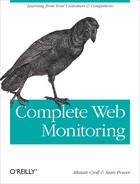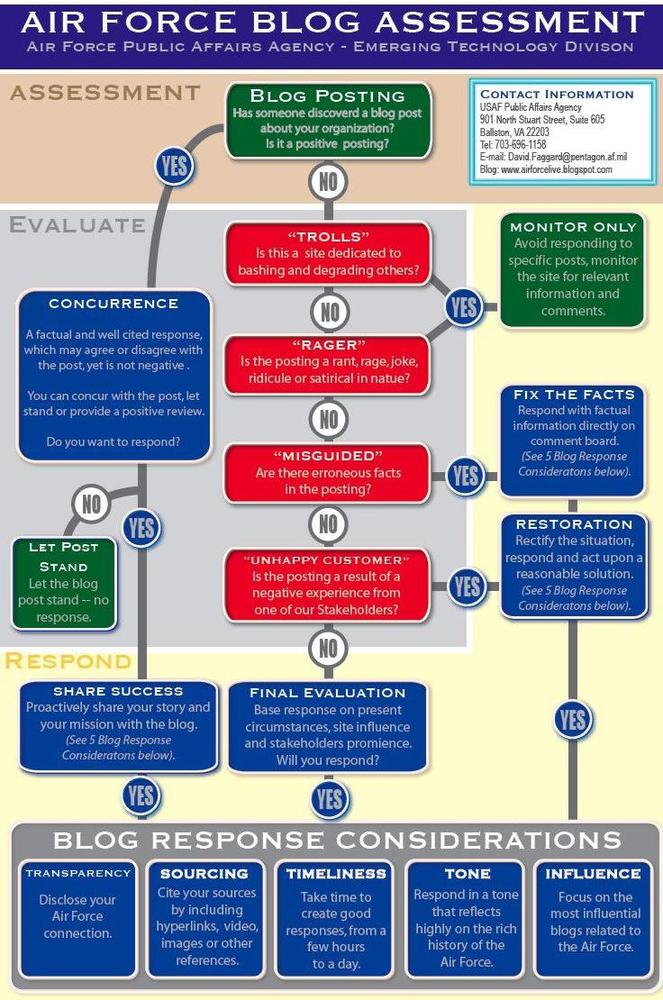Every time you see a conversation online that’s relevant to your organization, you need to consider following up. You might join the conversation, amplify what’s being said, or directly engage with those who are talking. Your response may be as simple as visiting a site and posting a comment or as complicated as mounting a dedicated marketing campaign to address a problem.
The U.S. Air Force developed an assessment tool, pictured in Figure 14-55, that helps it decide whether it should respond to comments and blogs. It’s an excellent example of turning community policies into clear, easy-to-follow directives that community managers can follow.
Figure 14-55. The Air Force blog assessment flowchart created by Capt. David Faggard, Chief of Emerging Technology at the Air Force Public Affairs Agency in the Pentagon
The most obvious step to take in a community is to join the conversation. You can do this to steer opinions, to meet others so that you can engage them personally, or simply to improve your reputation within the community.
If you’re adding information and opinions, make sure they’re independently verifiable and avoid spamming. Make sure you look at previous remarks to be sure you aren’t simply restating what someone has already said. Most importantly, start by listening: it’s a good idea to lurk for a while before jumping in.
Remember that if you join the conversation, you may be unable to leave. Companies like Comcast and JetBlue, both of which have started to use micromessaging for support, have found that their communities expect them to always be around. These firms have had to share the community management workload across many employees to provide the always-on presence their customers now demand.
A second way to follow up on a mention is to try to encourage the spread of a message. If someone else says something about you, it will be far more genuine than if you say it yourself. But that shouldn’t stop you from reinforcing it and pointing others to it, or from mentioning it on a blog or website.
Remember that there’s a fine line between telling your friends about something and flat-out spamming. Many social news aggregators have sophisticated algorithms to try to weed out automated upvoting, but there are companies that specialize in pay-for-voting, resulting in an “arms race” between communities and gray-market, paid popularity. Jason Calcanis’s offer to pay the top 50 users on any social networking site $1,000 a month further stirred up this controversy (http://calacanis.com/2006/07/18/everyones-gotta-eat-or-1-000-a-month-for-doing-what-youre/).
The backlash you’ll face for these kinds of practices often outweigh the value of the one-time burst of visits that occurs when your site makes it to the front page of reddit or Digg.
You may want to follow up directly with someone who mentions you online. Many social sites will let you see what else a person commented on or submitted, and you can follow that person’s messages on a variety of social sites, from FriendFeed to Twitter to Plaxo.
Avoid being creepy. If the person with whom you’re interested in connecting has an online presence that you can interact with, target this first, rather than using a more personal medium like email. For example, if a user has a blog, start by commenting on something she has written and build the relationship gradually. Gentle cultivation of community members is an important skill.
Remember, too, that just because everyone has a voice on the Web doesn’t mean everyone has a veto. These early days of community management have many marketers walking on eggshells, terrified of even the smallest sound from a plaintive customer. Communities will soon reach a more sustainable equilibrium that distinguishes between legitimate customer grievances and the whining of partisan entitlement.

